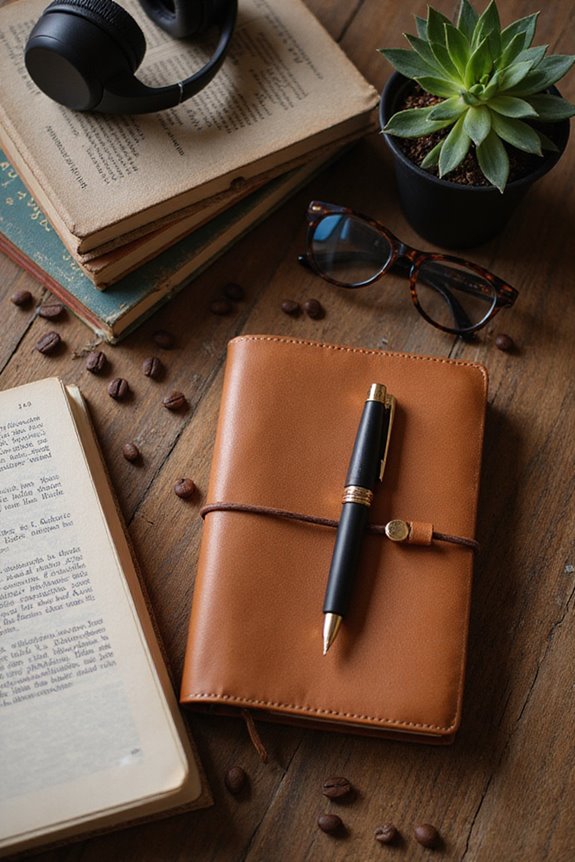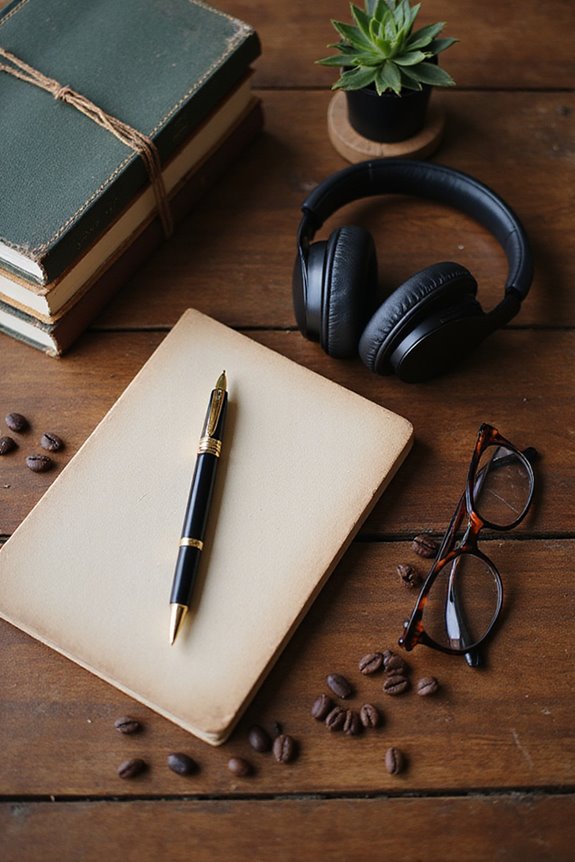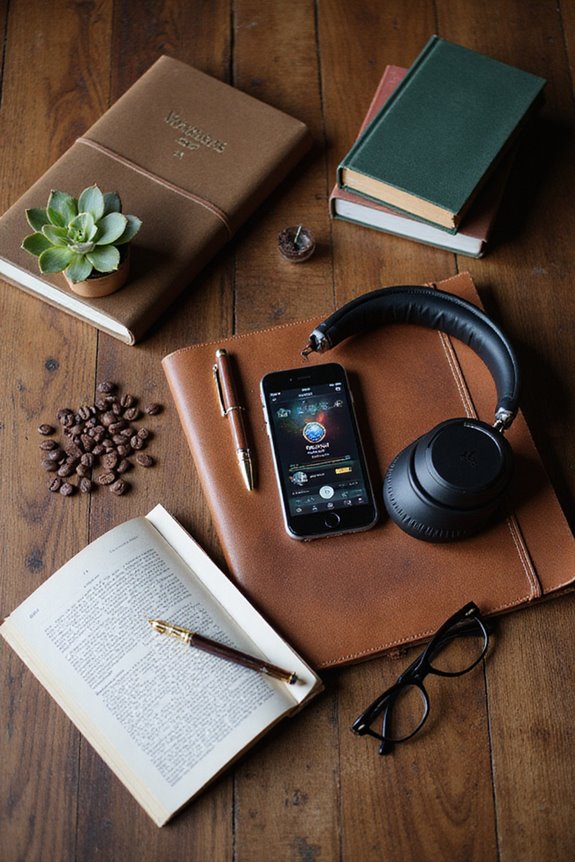As writers, we can use music to boost our creativity and focus. For instance, classical tunes can help us write faster, while upbeat jazz might spark our original ideas. It’s all about matching the genre to our writing task. Creating playlists can also shape the mood of our scenes. Plus, instrumental tracks minimize distractions, keeping us in the zone. So, let’s explore how music can not just accompany us, but really enhance our writing journey!
Key Takeaways
- Instrumental music provides a focused auditory environment, reducing cognitive interference and enhancing creative flow during writing sessions.
- Different genres influence creativity; classical music boosts writing speed while jazz is known to inspire originality.
- Music elevates mood, facilitating positive emotional states that enhance creativity and motivation in writing tasks.
- Creating tailored playlists can evoke specific emotions, helping to shape characters and scenes within a story.
- Experimenting with music genres allows writers to discover what best ignites their creativity and maintains their focus.
The Impact of Instrumental Music on Creative Expression
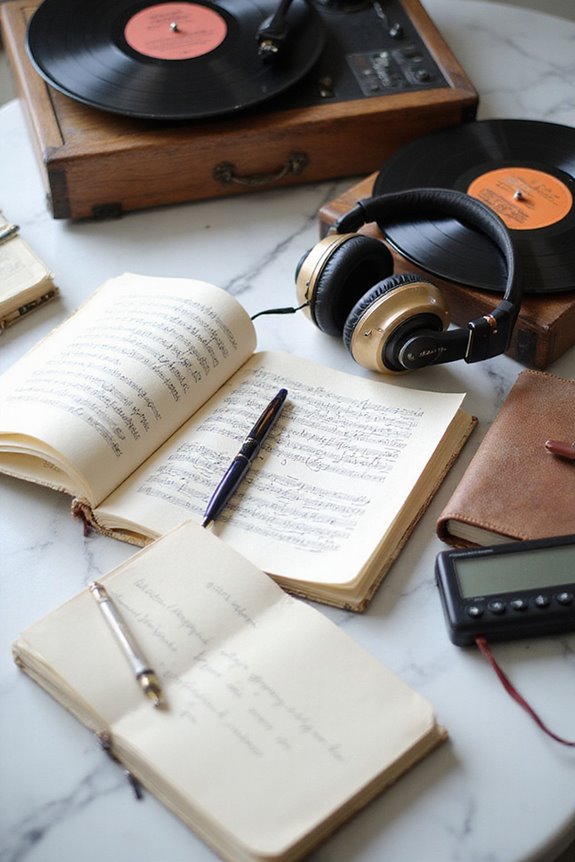
When we think about creativity, we often picture artists or writers immersed in their work, sometimes with a soundtrack playing in the background. Instrumental music can be a powerful tool for enhancing creative expression. It provides an auditory landscape that inspires us without the distraction of lyrics. When we write, this type of music may help reduce cognitive interference and keep our focus sharp. You might try different genres—classical could boost your writing speed, while jazz may spark originality. But remember, it’s essential to choose music that aligns with the task at hand. So, the next time you sit down to write, consider playing some instrumental music and see how it influences your creativity!
Emotional States and Their Influence on Writing
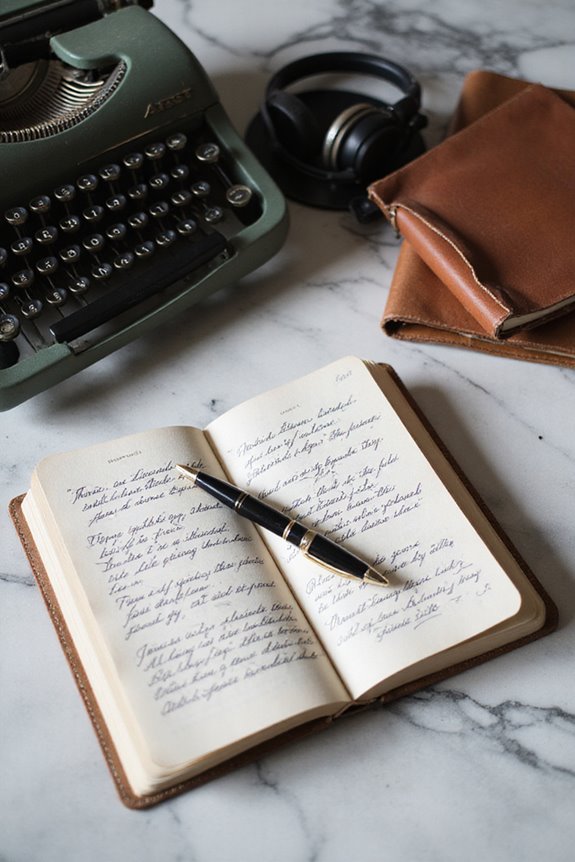
While positive emotional states can propel our writing creativity to new heights, it’s important to recognize that negative emotions can just as easily derail our progress. When we’re feeling confident or excited, our writing motivation skyrockets; we tend to see ideas as more creative. But if boredom or fear creeps in, those creativity blocks appear. To navigate these ups and downs, we can practice emotional regulation through writing. Engaging in expressive writing helps us clarify feelings, lifting our emotional state and boosting creativity. So, let’s embrace our emotions—whether positive or negative. By identifying and processing these feelings, we’ll enhance our creativity and keep those writing juices flowing. Remember, every emotion has something valuable to offer in our writing journey! Additionally, harnessing the therapeutic value of writing can further facilitate emotional exploration and ultimately enhance our creative output.
Enhancing Divergent Thinking Through Music
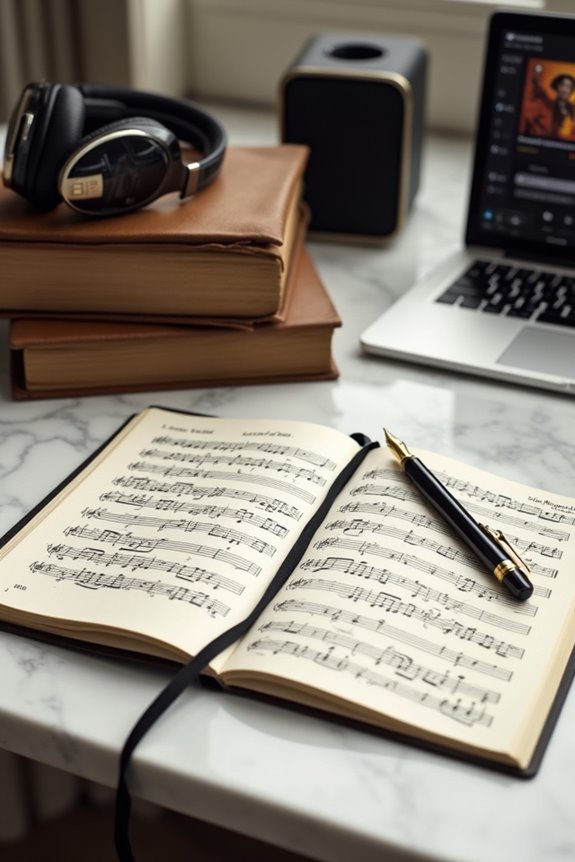
To enhance our divergent thinking skills, it’s essential to harness the power of music—something we’ve likely all experienced during a creative block. Research shows that certain musical genres, like classical music, can really kickstart our creativity. For instance, listening to Vivaldi’s “Four Seasons” may boost cognitive flexibility, allowing us to contemplate a range of ideas more freely. But don’t overlook happy music! It lifts our mood, broadening our minds to generate novel solutions. So, why not create a playlist with these tunes before starting our next creative project? Whether we’re brainstorming in class or tackling a tricky writing task, the right music can help us think outside the box. Let’s make music our creative partner!
Music as a Source of Inspiration

Music can be a powerful source of inspiration for writers, often sparking ideas and fueling creativity in ways we might not even realize. Just think about your song selection; each track can evoke emotions that directly shape our characters and themes. When we immerse ourselves in lyrical analysis, we may discover new narrative twists or conflicts that surprise us. Picture crafting a scene inspired by a heart-wrenching ballad or a lively anthem that captures excitement. We can create playlists tailored to our writing projects, establishing an atmosphere that invites the muse. So, the next time we feel stuck, let’s turn up the music, let the lyrics flow over us, and see how they breathe life into our stories. It’s like magic!
Cognitive Mechanisms Behind Music and Creativity
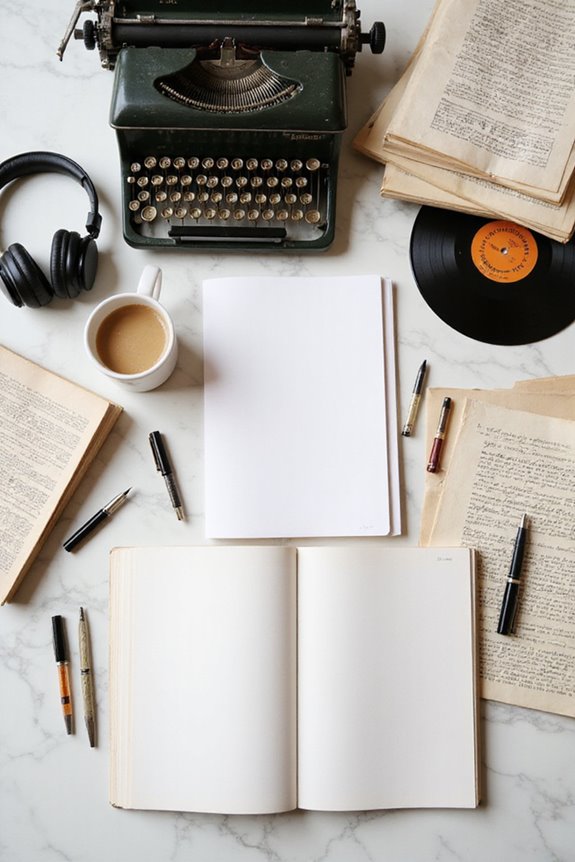
When we plunge into the world of creativity, it’s easy to overlook how wrapped up in our cognitive mechanisms we really are. Music perception plays a crucial role, as it affects our emotional states, which, in turn, enhances our cognitive flexibility. Think about it—listening to upbeat tunes can elevate our mood and motivate us, nudging our brains into a more agile state. However, it’s not all sunshine; the wrong type or volume of music might cause cognitive interference, stalling our creative flow instead of boosting it. Experiment with different genres and soundscapes, finding that sweet spot where your cognitive resources are utilized efficiently. Balancing arousal is key, so let music be your creative ally, guiding you toward innovative ideas!
Practical Strategies for Writers Using Music
Many writers find that incorporating music into their writing sessions can ignite new levels of creativity and focus. To enhance our writing routines, let’s try experimenting with different music genres. For instance, we might use upbeat tracks to keep our energy high during drafting, while mellow instrumental pieces can help during editing. Matching music to our project’s mood can spark inspiration—think of a suspenseful scene paired with intense music. We can also use songs without lyrics to avoid distractions. Creating a consistent soundscape, or even sharing playlists with fellow writers, can keep us engaged and motivated. So, let’s turn up the volume and see how music can elevate our writing process!
Customizing Your Musical Environment for Optimal Creativity
Creating the right musical environment can greatly impact our writing flow, especially if we customize it to fit our specific creativity goals. By aligning our music preferences with our writing routines, we can enhance productivity considerably. Imagine choosing instrumental tracks, like classical or ambient music, for a calm backdrop that encourages focus. We should also look for tunes around 60-70 beats per minute to inspire concentration. Don’t forget to adjust the volume—moderate levels keep the creativity flowing without distractions. If we explore various genres, like video game soundtracks or world music, we’ll find engaging soundscapes that suit our needs. With this tailored approach, we’re setting the stage for more imaginative writing sessions. Let’s get customizing!
Frequently Asked Questions
Can Music Improve Focus During Distracting Tasks?
We’ve found that music playlists can greatly improve focus during distracting tasks. By incorporating ambient sounds, we can create a conducive environment, reducing distractions and enhancing our concentration, making our work more productive and enjoyable.
What Types of Music Enhance Specific Writing Genres?
When considering music that enhances specific writing genres, we find ambient soundscapes foster concentration in fantasy, while lyrical inspiration thrives in contemporary fiction. Each genre calls for a tailored soundtrack to ignite our creativity effectively.
How Does Silence Compare to Music for Creativity?
When we consider silence versus music for creativity, silence benefits focus and reduces distractions, but music often elevates mood and cognitive flexibility. Balancing both can enhance our creative processes in unique ways, depending on our needs.
Does the Volume of Music Affect Creative Output?
We’ve found that the volume of music definitely affects creative output. With a moderate tempo and considering personal preference, we can enhance our creativity while avoiding distractions caused by high volumes.
Are There Specific Genres That Inhibit Creativity?
When we examine genre preferences, we notice certain distraction factors can inhibit creativity. Fast-paced tunes, lyrical layers, and loud sounds often derail our focus, while soothing sounds enhance our writing experience. Let’s choose wisely!


